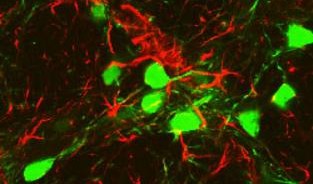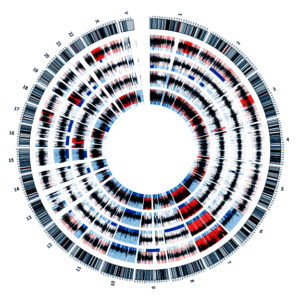
Clinical Research
Clinical Research Deepens our Understanding of Disease
At the Pacific Neuroscience Research Center, we utilize molecular diagnostics and gene expression analysis in addition to other clinical data to personalize treatment plans for each patient.
Working in conjunction with the Pacific Brain Tumor Center, we combine clinical expertise with leading-edge research to gain an in-depth understanding of each patient’s individual tumor. For our patients, this partnership between physicians and research scientists means access to superior patient care and optimized treatment. In addition, we conduct ongoing clinical trials that provide more treatment options to eligible patients.
We conduct clinical research studies, typically retrospectively, to analyze the outcomes of our patient care. Sometimes this is done with other institutions. Some of our clinical research efforts are summarized below:

- Metastatic Melanoma:
The Saint John’s Cancer Institute has a long track-record treating patients with primary and metastatic melanoma. Metastatic melanoma is unique with respect to brain metastases in that surgical resection of tumors is associated with improved outcomes. In conjunction with our colleagues at the Saint John’s Cancer Institute and The Angeles Clinic, we treat numerous patients with metastatic melanoma to the brain. The Angeles Clinic has numerous active clinical trials for patients with metastatic melanoma. For further information, visit their website. - Brain Tumor Biomarker Studies:
This is an ongoing study aimed at gaining a better understanding of tumor genetics and growth patterns to plan more effective treatments beyond surgery. All patients undergoing removal of a brain or skull base tumor (such as a glioma, metastatic brain tumor, chordoma, or craniopharyngioma), are eligible to participate. For participants, a portion of their tumor specimen removed at surgery is placed in a tumor repository. Tumor cells are then studied for specific genetic markers that may indicate their aggressiveness or potential responsiveness to various therapies such as a chemotherapy, immunotherapy or radiosurgery. This is study is being performed in collaboration with Dr. Dave Hoon, Director of Molecular Oncology at JWCI.- Melanoma Genetic Analysis:
Melanoma is known to metastasize to the brain more frequently than other types of cancers. Chemotherapy is less effective for these brain lesions compared to the rest of the body. Hence, surgery and radiation therapy remains a mainstay for treatment of these tumors. This study analyzes the genetic composition of melanoma tumors that have metastasized to the brain. In particular, it is studying the effect of systemic chemotherapy, immunotherapy and radiation therapy on these tumors. This study is being performed with Dr. Dave Hoon at the Saint John’s Cancer Institute and is funded by an R01 NIH grant. - Meningioma Genetic Analysis:
Though generally benign, meningiomas can be invasive and very difficult to treat effectively. This study analyzes the genetic composition of these tumors in order to identify potential genetic targets that can explain tumor pathogenesis and potentially serve as therapeutic targets. This study is being performed with Dr. Dave Hoon at the Saint John’s Cancer Institute. It is funded by a grant from Carol Zumbro. - Meningioma Proteomics Study:
The progression of benign meningiomas to more aggressive subtypes including atypical and malignant meningiomas is poorly understood. In collaboration with the UCLA Proteomics Laboratory and Dr. Margaret Simmonian, we are studying the protein expression in representative samples of each type of tumor. This will be compared to the genetic profile of these tumors to better understand the development of these aggressive tumors. This study is funded by a grant from Meningioma Mommas.
- Melanoma Genetic Analysis:
- Impact of Executive Functioning Impairment on Quality of Life in Patients with Brain Metastases or Meningiomas:
This ongoing study is evaluating specifically how metastatic brain tumors (a malignant tumor) and meningiomas (benign tumors) differentially affect higher brain functions (executive functions) such as planning, organization, impulse control, emotional regulation, attention, concentration etc. This study will also look at how problems with these executive functions can affect patient quality of life before and after treatment for their tumor(s). This study plans to show the importance of understanding patients’ strengths and weaknesses in these functions. The outcomes of this study will help develop more effective therapies and improve quality of life. - Ongoing Retrospective Studies:
We are constantly looking for ways to improve the surgical and medical therapy we provide to our patients. Hence, we are actively involved in reviewing the numerous surgical operations and medications we offer our patients. We study patient outcomes including tumor remission or cure rates, improvement of pre-operative symptoms, post-operative management, and rates of treatment-related complications. A list of our most recent publications can be found here. - Skull-base and Endoscopic Microdissection Laboratory:
An integral component of cutting edge neurosurgery is an intimate understanding of the microsurgical anatomy of our patients. To further our knowledge in this field, we have established the Skull-base and Endoscopic Microdissection Laboratory. This facility under the direction of Dr. Garni Barkhoudarian, offers our fellows and researchers a high-quality facility equipped with state-of-the-art neuronavigation, endoscopy, microscopy, instrumentation and HD video recording technology to perform high quality microsurgical dissections. Such an effort will improve our understanding of the relevant anatomy and its variations across patients. In addition, it will serve as an important training venue for our rotating surgical fellows. This project has been supported by in-kind donations from: Stryker, Karl Storz Endoskope, Surgical West, Inc., and Mizuho.